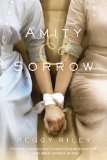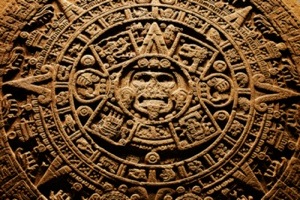Summary | Excerpt | Reading Guide | Reviews | Beyond the Book | Read-Alikes | Genres & Themes | Author Bio

Critics' Opinion:
Readers' Opinion:
First Published:
Apr 2013, 320 pages
Paperback:
Feb 2014, 336 pages
 Book Reviewed by:
Book Reviewed by:
Sharry Wright
Buy This Book
This article relates to Amity & Sorrow
The end is nigh!
Or so has been the claim for many years. And despite a success rate of zero, people continue to make passionate end of the world predictions, looking for the Apocalypse in just about every major turn of events from Y2K to Weapons of Mass Destruction to the ending of the Mayan Calendar. In fact, according to a survey taken in 2001 by the Barna Research Group, forty percent of Americans at that point believed that supernatural intervention would lead to the eventual end of the world.
The first recorded end of the world prediction came in 634 BCE. Over subsequent years, there have been many, many more. What follows is just a sampling.
 A group of "Preppers" in Boston stored food and came together on a website meet-up page to share survival tips. A retailer in Russia sold "Apocalypse Kits" that included a bottle of vodka. Authorities in France, fearing a mass exit, shut down a road leading to a site in the Pyrenees that had been said to be a good place to go when disaster struck.
A group of "Preppers" in Boston stored food and came together on a website meet-up page to share survival tips. A retailer in Russia sold "Apocalypse Kits" that included a bottle of vodka. Authorities in France, fearing a mass exit, shut down a road leading to a site in the Pyrenees that had been said to be a good place to go when disaster struck.Most scientists tell us that yes, the world will end eventually—years from now when the sun burns itself out or the universe is torn apart by its continual expansion. And it is quite likely that humans will be long extinct by then, having made our planet uninhabitable through our own folly. But as long as we are still here, I suppose there will continue to be predictions of total destruction and people will prepare themselves for the imminent end of time.
Filed under Cultural Curiosities
![]() This "beyond the book article" relates to Amity & Sorrow. It originally ran in April 2013 and has been updated for the
February 2014 paperback edition.
Go to magazine.
This "beyond the book article" relates to Amity & Sorrow. It originally ran in April 2013 and has been updated for the
February 2014 paperback edition.
Go to magazine.





The House on Biscayne Bay
by Chanel Cleeton
As death stalks a gothic mansion in Miami, the lives of two women intertwine as the past and present collide.

The Flower Sisters
by Michelle Collins Anderson
From the new Fannie Flagg of the Ozarks, a richly-woven story of family, forgiveness, and reinvention.

The Funeral Cryer by Wenyan Lu
Debut novelist Wenyan Lu brings us this witty yet profound story about one woman's midlife reawakening in contemporary rural China.
Your guide toexceptional books
BookBrowse seeks out and recommends the best in contemporary fiction and nonfiction—books that not only engage and entertain but also deepen our understanding of ourselves and the world around us.